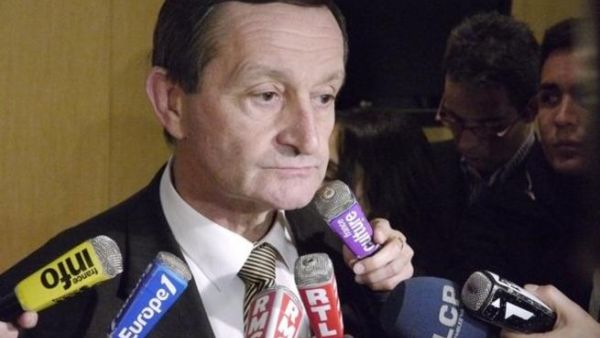As the French election campaign heats up, President Nicholas Sarkozy seems poised to lose in a run-off to leftist candidate Francois Hollande. The primary issue of the campaign has been the economy, with foreign affairs, and the Middle East as a whole, taking a back seat.
Nonetheless, if Socialist Party candidate Hollande wins the presidency, it may result in a change of tone in French foreign policy. Some observers have expressed concern that the French left will repeat the same misjudgments it has made about foreign policy in the past. An exemplar of this is Hollande's fellow party member, MP Gerard Bapt.
Gerard Bapt has lately been a fierce critic of the regime of Syrian President Bashar al-Assad. Last July, for example, he expressed disappointment that the Arab League and others had not done more to stop the violence. However, this has not always been his tone towards Assad.
Prior to the March 15 2011 revolution, Gerard Bapt was a staunch supporter of the Assad regime. The French cardiologist has served as Chairman of the French-Syrian Friendship Association. While in this position, he publicly repudiated the decision of President Sarkozy in 2008 to cut off contact with Syria due to its direct meddling in the political crisis of neighboring Lebanon. He said then, "In spite of current temporary differences between Syria and France, relations between the two states will not be affected and cooperation will continue." The Association openly supported strong ties with Assad up until the outbreak of the current revolution.
Given the European left's professed love of human rights, interference in Lebanese affairs is not the only action by the Syrian regime one might expect to have raised Gerard Bapt's hackles. The Syrian government is a one-party system that has for years effectively functioned as a hereditary dictatorship. Popular information-sharing websites have been blocked intermittently since 2008. Both Human Rights Watch and Amnesty International have documented cases of imprisonment, torture, and killing of political dissidents for years before the current revolt. Travel bans have also been used against dissidents, a practice forbidden by international law.
It is to be hoped that MP Bapt has learned from this experience that a government that readily represses its people in times of "peace" is not to be supported, let alone trusted to show moderation in the face of a rebellion. However, this appears not to be the case. On March 7, Bapt was quoted by the semi-official Fars News Agency in Iran of saying that, should the left win in the upcoming elections, Iran may expect French foreign policy to have a very different tenor. He has openly criticized EU sanctions against Iran.
Certainly, Iran has not been any more liberal than Syria. The Islamic Republic, too, is known for its imprisonment and torture of dissidents, particularly at the notorious Evin Prison. When the liberal opposition "Green Movement" objected to blatant fraud in the 2009 presidential elections, the regime responded with arrests and brutal crackdown against protestors.
Perhaps most importantly, given Bapt's about-face on the Assad regime, is western intelligence information that Iran is directly supporting the Syrian military in its brutal campaign.
The EU decision to strengthen the sanctions on Tehran came after the IAEA, which has been extremely reserved in its reports, strongly suspects Iran is working on the development of nuclear weapons.
Gerard Bapt has also long supported developing ties with Lebanon's Hezbollah, expressing his positive views of the organization's "national vision" and "social and cultural role." He has even gone so far as to say that the end of Hezbollah would be the end of Lebanon. Although Hezbollah is not officially listed as a terrorist organization by the EU or France, the European Parliament passed a non-binding resolution in 2005 urging the EU Council to list it as such, noting "clear evidence" of "terroristic activities." One could also argue that Hezbollah's use of gunmen to threaten its opponents, and its use of violence to gain a veto over the entire Lebanese government are not conducive to the democratic environment Bapt desires in Syria.
France under Sarkozy has been active participant in efforts to oppose Iranian hegemonic ambitions in the Middle East through the Iran-Syria-Hezbollah axis. If Bapt's views are representative of the French left, and if the French people want to prevent more cities in region from becoming like Homs, then the electorate had best consider whether the economy should really be their only top priority. (News Editor)







